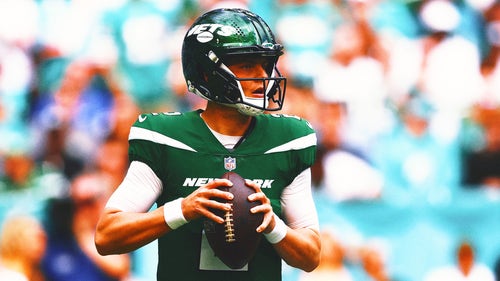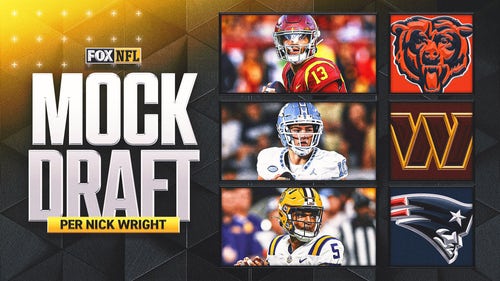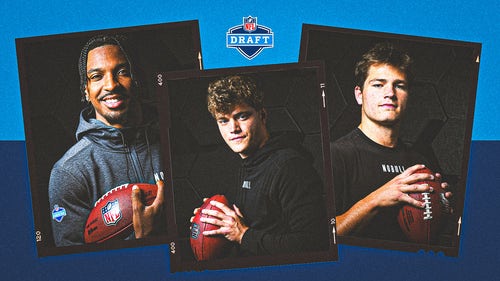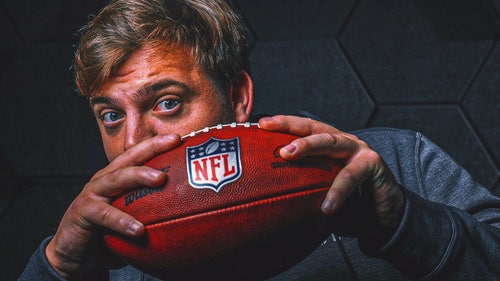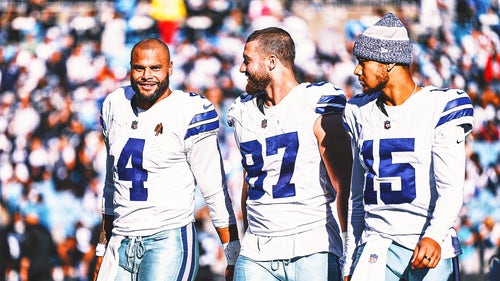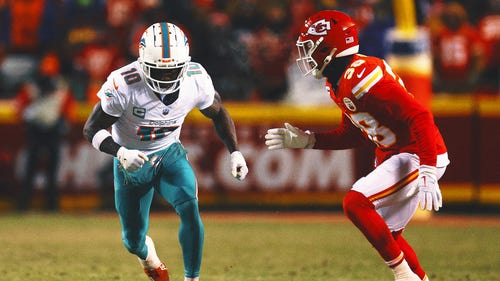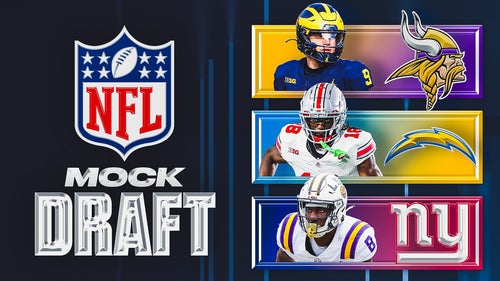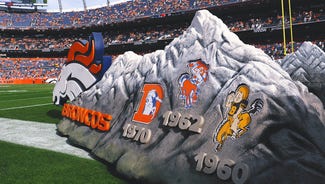
Supplemental draft usually a bust
There are no marquee names among the six players entered in Thursday’s NFL Supplemental Draft.
In fact, it appears likely that none will be drafted.
This is probably a good thing based upon supplemental draft history.
Nobody knows for sure, of course. Maybe a franchise believes that one of the college prospects in the 2013 draft — defensive tackle Nate Holloway (Nevada-Las Vegas), cornerback Damond Smith (South Alabama), defensive ends Toby Jackson (Central Florida) and James Boyd (UNLV), and wide receivers O.J. Ross (Purdue) and DeWayne Peace (Houston) — will follow in the footsteps of wide receiver Cris Carter. A 1987 fourth-round draft choice from Ohio State, Carter is the only one of the 42 all-time supplemental picks to reach the Pro Football Hall of Fame.
Though there are other success stories such as nose tackle Jamal Williams, guard Mike Wahle and quarterback Bernie Kosar, the majority of supplemental choices have flopped at the NFL level. Talent is the main reason, particularly for those players who didn’t spend enough time in the college ranks to effectively hone their skill sets before entering the pro ranks.
The other major issue stems largely from the academic and off-field problems that pushed most of these players into the supplemental draft in the first place. Some simply may not be smart or disciplined enough to flourish in a league where both greatly determine how well a player fares.
The supplemental draft was created in 1977 to accommodate players who were declared ineligible for the upcoming college season or faced similar hardships that affected their playing status after the deadline had passed to enter the traditional NFL draft. The league tightened its eligibility guidelines after Kosar and his agents manipulated the process to land with the Cleveland Browns in 1985.
Clubs choose in the same order as during the preceding college draft. Any team that selects a player in the supplemental draft forfeits its pick in the corresponding round of next year’s college draft. The process is conducted by email without any of the pomp-and-circumstance that annually surrounds the NFL draft showcase in New York City.
Former Baylor wide receiver Josh Gordon became the 11th supplemental pick since 2000 when chosen in the second round last July by Cleveland. Gordon started 13 games as a rookie and finished with 50 catches for 805 yards and five touchdowns.
But whether Gordon can build upon such an impressive NFL start is now in question.
Gordon was suspended for the first two games of the 2013 season under the league’s substance-abuse program. In 2010, Gordon was arrested on a marijuana possession charge that was later dropped. Gordon told the Houston Chronicle he was kicked off the Baylor football team in 2011 after a positive test for marijuana.
Dallas Cowboys nose tackle Josh Brent faces a far more uncertain NFL future.
A 2010 seventh-round supplemental draft pick after becoming academically ineligible at the University of Illinois, Brent had played in 39 games with five starts for the Cowboys while developing into one of their top young defensive linemen. He now faces trial for intoxication manslaughter after a DUI-related incident last December that resulted in the death of a Cowboys teammate. Brent also recently served a short jail sentence after two positive tests for marijuana while out on bail.
The NFL’s other 2010 seventh-round supplemental pick was Chicago Bears running back Harvey Unga. He was the leading rusher in Brigham Young history but was kicked off the team for violating the school’s honor code.
Unga spent his entire rookie year on injured reserve, then missed all of the 2011 season after leaving the Bears during training camp to deal with what was described as a personal issue. Unga finally reached Chicago’s 53-man roster for the 2012 season finale but still hasn’t had an NFL carry in three seasons.
Defensive tackle Manny Wright also was a disappointment. An academic washout at Southern Cal who became a 2005 fifth-round supplemental pick by Miami, Wright is best remembered for crying on the field when berated by then-Dolphins head coach Nick Saban during a preseason practice. Wright played in three games as a rookie, then refused to report to the Dolphins for his second NFL season as he battled depression issues. Wright would play one more year as a New York Giants reserve before washing out of the league.
Outside linebacker Ahmad Brooks (Cincinnati, 2006) and left tackle Jared Gaither (Baltimore, 2007) have their share of baggage, too.
Brooks had a bumpy road at the University of Virginia. He was charged with marijuana possession in 2003 and later kicked off the squad following an off-field fight with a teammate. The Bengals made him a fourth-round supplemental pick but released him after two nondescript seasons.
Brooks reinvented himself with San Francisco and earned a six-year, $44.5 million contract extension during the 2012 offseason. Brooks, though, may be back to his old ways.
The Santa Clara County district attorney’s office in California is investing whether to press charges following a June 8 altercation involving Brooks and 49ers teammate Lamar Divens. According to witness reports, an impaired Brooks is alleged to have hit Divens three times with a beer bottle and threatened to retrieve a gun following an argument. The San Francisco Chronicle reported that Divens has asked police to drop the case because he didn’t want it to affect his NFL career.
Baltimore used a 2007 fifth-round supplemental pick hoping that Gaither, an academic casualty at the University of Maryland, could develop into a replacement for future Hall of Fame left tackle Jon Ogden. That never happened. Although he played well at times, Gaither wasn’t re-signed in 2011 after missing the previous 1-1/2 seasons because of injuries.
Gaither then washed out in Kansas City and San Diego for similar reasons, leaving his NFL future in limbo. U-T San Diego reported that Chargers players believed Gaither was faking the severity of his ailments last season after signing a four-year, $24.6 million extension. Gaither, who played in only four games before landing on injured reserve, was released in March and remains unsigned.
Offensive lineman Milford Brown (Houston, 2002) and defensive back Paul Oliver (San Diego, 2007) have enjoyed solid NFL careers. Brown started 47 games during stints with four teams over six seasons before retiring in 2009. Oliver remains a Chargers reserve with 12 career starts.
The NCAA claimed Brown’s college eligibility had expired at Florida State, forcing him into the supplemental draft. Oliver was declared academically ineligible at Georgia.
The only other supplemental pick on a current NFL roster is former Ohio State quarterback Terrelle Pryor, a 2011 third-round selection by Oakland. The NFL suspended Pryor for the first five games of his rookie season by claiming he had “manipulated” the league’s supplemental draft rules by applying after the traditional college draft was held. Pryor’s eligibility at Ohio State was in question because of his involvement in a payola scandal that led to NCAA sanctions.
Pryor’s future in Oakland is shaky after he notched one start in his first two seasons. He is battling to make the 53-man roster after the Raiders traded with Seattle for veteran quarterback Matt Flynn, selected Arkansas’ Tyler Wilson in the fourth round of this year’s college draft and signed Penn State’s Matt McGloin as an undrafted free agent.
The two remaining players chosen in the supplemental draft this century never proved worthy of where they were chosen. Running back Tony Hollings, a 2003 second-round pick by Houston after being declared academically ineligible at Georgia Tech, finished his NFL career with 49 carries for 149 yards in three seasons.
Jeremy Jarmon didn’t even last that long. Facing a year-long suspension at Kentucky after testing positive for a banned performance-enhancing substance, Jarmon entered the supplemental draft and became a 2009 third-round pick by Washington. He notched 11 tackles in 16 games with one start before being traded to Denver in the 2011 preseason. He failed to make the Broncos’ 53-man roster and retired in 2012.
Selecting a player in the supplemental draft is often a desperate measure by a team that had failed to adequately address personnel holes earlier in the offseason. But the value of future college draft choices frequently serves as a deterrent, especially in a supplemental class without blue-chip prospects such as this one.
The most accomplished of the six entries are Peace and Ross. Peace, the University of Houston’s leading receiver last season with 54 catches for 603 yards and two touchdowns, was declared academically ineligible in June.
Ross, who had 56 receptions for 454 yards in 2012, was suspended in February by Purdue coach Darrell Hazell for violating team rules. Ross also was academically ineligible for the 2011 Little Casear’s Bowl.
Longtime NFL personnel director Gil Brandt of SiriusXM NFL Radio said Ross, Peace, Holloway, Smith, Jackson and Boyd weren’t ranked among the top prospects in the 2014 scouting reports he has compiled.
The most likely scenario for all six players is to sign with an NFL team as an undrafted college free agent. That is what Green Bay reportedly tried doing with Smith in April before being told by the NFL that he would be forced to enter the supplemental draft.






































































































































